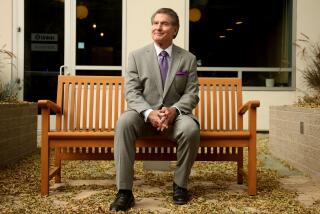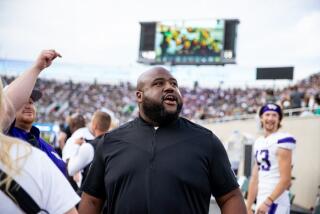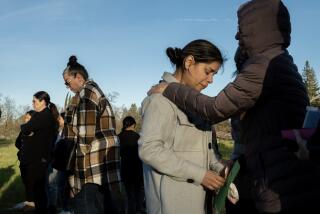At 18, a Veteran of Hard Road : omm’A Givens Never Has Had It Easy, but His Lack of Pampering Is Expected to Make Him Even Better UCLA Center
- Share via
His name is taken from the ancient Sanskrit mantra chanted during many Hindu meditations. It is said to represent the first sound generated by the newly created universe. It translates roughly as the universe and everything in it.
His name is omm’A Givens and even though he is only 18, he can tell you, it’s a strange and wondrous universe.
He is 6 feet 11, a freshman basketball player at UCLA. But the thing that makes omm’A Givens interesting, unusual, compelling, is not merely his size, his game or his name, although those all seem like pretty fair places to start.
He was born in a farmhouse in rural Frances, Wash., where Roger Givens delivered his first son himself. Roger, a landscape architect and jack of all trades, named the newborn omm’A. The omm comes from the Hindu mantra. Roger, a Native American, added the apostrophe and the A to the name so it would be unique.
omm’A Givens’ life has been nothing, if not unique.
At UCLA, where he will play this season, huge things are forecast for the freshman with the big man’s game and the unusual name.
“Let’s see, he’s 6 foot 11, he’s got size-18 feet, he’s very, very mobile, he’s got more God-given ability than any center at UCLA since Bill Walton,” Bruin Coach Jim Harrick said.
Givens’ God-given ability was last seen when he played basketball in Aberdeen, a small logging town and seaport in southwest Washington known mainly for the Weyerhauser lumber mill on the river and as the hometown of the late Nirvana leader Kurt Cobain.
In the winter, during the basketball season, it is a city painted gray. Aberdeen is so close to the ocean, the prevailing winds bring clouds in as guests that don’t leave for months.
In the omm’A Givens era, there was no room for gloom inside the gym. Aberdeen basketball Coach Brad Fuhrer said his most prized player is destined to become even better.
“By the end of his sophomore year, I’m looking forward to seeing how good he is,” Fuhrer said. “He has the physical tools to go beyond college. He has the inner drive, what it takes inside.”
Take a look inside omm’A’s universe and what you see might be surprising.
For a while, when he was little, omm’A’s universe was very small. Roger Givens kept it that way for his sons, omm’A and Maori, whom he had named after New Zealand’s aborigines. Roger made certain that their world revolved around him, basically to keep their mother, Janice, out of it.
Roger was convinced that Janice was dangerous and unfit to be a mother. He said she was a religious fanatic, a cult figure, a witch. He once told her that he would rot in jail before he would turn the kids over to her.
So he kidnaped them. They were gone for 2 1/2 years.
“It’s been pretty hectic,” omm’A said. “I don’t know where to start.”
*
Janice and Roger never married, but that seemed to be only a technicality in their relationship. After all, they had known each other since they were 12, living in San Diego, and they had struck up a relationship again after Janice’s first marriage failed.
Roger and Janice, an African-American who also had two daughters, produced omm’A and Maori. If not idyllic, their life seemed reasonably normal. Janice got a job teaching in Seattle, while the rest of the family lived on a farm near Frances, about 100 miles southwest. When Janice returned to Frances, things started getting a little crazy.
One day, Roger burned the farmhouse in a scheme to collect insurance money. According to Janice, Roger had planned it so he could get all of his belongings out. He had timed how long it would take to start the fire, run to the neighbor’s house to call the fire department, then run back and empty the house.
But on the day Givens chose, the neighbor wasn’t home, so Givens had to run to someone else’s house and use the phone there.
“So by the time he got back, his stuff got burned up,” Janice said. “Yeah, he had a plan.”
Afterward, the family lived in the barn and omm’A slept in the chicken coop. He was not yet 5, but he was learning to cope. For him, as well as the rest of the family, the bathroom was the nearby woods.
When the relationship between Janice and Roger grew rocky, they decided to live apart. Roger, who wanted custody of the boys, decided he would take omm’A and Maori, leaving Janice with her two daughters.
For six months, Roger, omm’A and Maori lived on another farm in Onalaska, Wash. When Janice learned where they were, she and the girls rejoined them and Roger came up with another plan. In what was to become a pattern, the plan involved traveling.
“Pops took everybody to California,” omm’A said. “He told me he had to take me somewhere, that we couldn’t live up there.”
So the Givens clan arrived in San Diego, where Roger again abandoned Janice and the girls, warning Janice that she was not to come looking for him, and took the boys back to Washington.
It took Janice three months to summon the courage to force a showdown. Roger, omm’A and Maori were living again on the farm in Frances. Janice and a sheriff’s deputy confronted Roger, who wielded a tire iron.
So Janice came up with a plan of her own. She sold the farm shortly before foreclosure and when Roger showed up to claim the proceeds from the sale, she had him arrested. Even so, Roger refused to back down.
“He said he would rot in jail before he would turn the kids over to me,” Janice said. “Why? Because I was a Christian. He said that I was a fanatic. But I got the kids.”
Janice then met John Lead and married him in December of 1982. Roger was awarded visitation rights, however, and Janice was not happy about that.
“I told them, ‘As soon as you do that, he’s going to run,’ ” she said.
One day, he did. Roger picked up 7-year-old omm’A and 5-year-old Maori from Janice for a weekend visit.
“The lady across the road said they let out a whoop, they drove down the road and that was the last I saw of them for 2 1/2 years,” Janice said.
Being on the run turned out to be an exhilarating experience for omm’A. Roger, earning money from odd jobs, drove his convertible to San Diego, then on to Nevada, Utah, Colorado, Wyoming and South Dakota, finally winding up in Houston.
“He had just enough (money) so we could live OK,” omm’A said. “We never missed any meals or anything. He told us we weren’t coming home. We cried initially, but once we woke up the next morning, well, we were all right.
“He loved that convertible and we would always sleep with the top down, so it was always fun. We didn’t really miss home that much. We didn’t get along with our stepdad, you know. It was like a big vacation, you know.”
Meanwhile, Janice tried to track them. She contacted organizations that search for missing children. She sold her belongings to finance the search effort. She got behind in her bills and her telephone was disconnected. She nearly gave up hope.
There was only one close call, omm’A remembered. Roger and the boys were staying with relatives in Imperial Beach and Janice’s niece saw them.
“My dad freaked,” omm’A said. “He said ‘Let’s get out of here, man.’ We, like, packed up all this stuff in two minutes and we were gone. He wouldn’t stay in California after that.”
At one point, Roger considered changing their last name to Alexandros. But then, he had always seemed to be big into names.
Ron Mannan was Givens’ friend for more than 15 years. Mannan, who runs a plant nursery in Frances, shared a love of trees with Givens, whom he called “Leo.”
“He was a total Leo,” Mannan said. “It was his sign--outgoing, friendly. Everyone called him Leo. He probably named himself.”
Givens was the type of person others loved to be around, Mannan said. Mannan surely did. They both belonged to the Northern Nut Tree Assn. and talked a lot about trees.
“We were nut tree freaks,” he said.
“He was so friendly. People around here driving on the streets would just, like, get in a wreck to stop and say hello to him and give him a hug if they saw him. It was amazing the power he had. I think omm’A picked up a lot of that.”
Roger allowed omm’A and Maori to write letters to Janice, which omm’A remembers doing a few times, but Janice says she never received any and suspects they were never mailed.
“On their birthdays, omm’A and Maori have told me since, he would tell them that Mom doesn’t care anything about them because she didn’t send them anything,” Janice said. “I never knew where they were, so I couldn’t do it. That sort of bothers me.
“There’s a lot of things you don’t really realize that they are in there, but they are sort of festering. I think my kids are carrying stuff like that. I know one of them is.”
Maori, 16, has spent most of the summer in juvenile detention because of drug offenses. But Janice thinks Maori is coming around and has enrolled him at Aberdeen High. In a touch of irony, she has made plans for him to run on the cross-country team.
His brother said Maori simply hasn’t come around yet.
“My dad, he always liked me more,” he said. “I was bigger and everything. I didn’t get spankings. Maori always would get them. I sort of feel bad for him because of that.”
Roger and the boys were in Houston for nearly two years. One day, Roger got into a fight and the police took him to the station, where they ran a computer check and discovered his history. Janice got a call, the boys flew to their aunt’s house in San Diego to meet her, then went back to Washington, to South Bend, south of Aberdeen .
The odyssey was over. Roger Leo Givens Alexandros moved to Seattle and his elder, taller son set about trying to become an ordinary school kid.
It wasn’t easy, especially because omm’A had to make up for the years he lost. Rolf Olson, the basketball coach at Raymond, saw omm’A in the fifth grade and began tutoring him. It was a long, difficult task, made even tougher because omm’A was still having trouble getting along with his stepfather. There was also a racial problem, Raymond being nearly all white.
“Some guys, they liked to call me . . . “ omm’A said. “I didn’t get along too well there. I basically didn’t have any friends. I was totally different. I was an outcast.”
Because of the friction at home, omm’A moved out for a year and lived with Olson. Givens was beginning to excel at basketball and nothing was going to stop him--not being called “Omaha,” not being a black in a white school, not even the growing pains he experienced in his legs. Janice remembers being told that her omm’A simply wasn’t trying hard enough, but she knew that his legs hurt when he ran.
At the end of his sophomore year, omm’A wanted to play at a bigger school. He had played AAU basketball with some of the Aberdeen players and found out a lot about the city and school. So he moved to Aberdeen, where he lived with first one family, then another, and eventually Fuhrer, the coach, until Givens’ family could join him.
When the rest of the family arrived, they settled comfortably in a white frame house. Everything seemed in place. Then, they learned, omm’A’s father had AIDS.
Against Janice’s wishes, omm’A re-established contact with Roger and went to see him in Seattle.
“I talked to him about his lifestyle,” omm’A said. “I warned him that AIDS was out there. He already knew he had it. So he told me. We sat there on the road and started crying.
“That was April. It wasn’t very long after that, he was starting to fall apart. His speech was a little blurry. It affects people differently. There were a lot of people in his house. He lived on Lake Washington.
“I came back from a basketball camp to see him again and he couldn’t talk at all. It was really strange at his house. All these people, they had taken everything--his TV, his money, all of it.
“It was sad watching him go like that. He was so proud, you know. He was so skinny and rickety.”
Before Roger Givens died in his big house on Lake Washington, Janice visited him.
“The Roger Givens that I knew and had done all this stuff to me personally, omm’A’s telling me he’s changed and I’m thinking to myself, ‘No way,’ ” she said. “But omm’A saw something and when I went up there myself, I saw it, too.
“I think that’s why the Lord had me go up there. I didn’t hate Roger, but it was close to hate as you could get. It was something that I had to struggle with as a Christian. When I saw him, I said, ‘Roger, where are you?’ I heard this little teeny voice, ‘I’m in here.’ It was just so weak.
“I remember when I saw him, all I said was, ‘Roger, what have you done to yourself?’ He didn’t really say anything. He was just real sad.”
*
The most revealing aspect of the omm’A Givens saga is that his future as a basketball player might be more compelling than whatever happened to him in his childhood.
He became the greatest high school basketball player in state history, putting his name ahead of Clint Richardson, James Edwards, Steve Hawes, Detlef Schrempf and Doug Christie.
Sonny Vaccaro is one of the top judges of high school talent. He runs a number of summer high school basketball camps, conducts the Magic Johnson all-star game and is a top sports-marketing consultant.
“He has had to overcome, well, you name it,” Vaccaro said of Givens. “He wasn’t catered to. He wasn’t your spoiled little brat, high school All-American who has had everything handed to him. Because omm’A has had to overcome so many personal things, that’s the biggest reason I think he’ll make it.”
Dick Vitale, a former coach and now a college basketball commentator for ESPN and ABC, was impressed with Givens after seeing him play in a high school all-star game.
“Very active, shot-blocker, looks like he could be a big factor,” Vitale said. “He has the work ethic, the right parts. Let’s hope life gives him a fair shake, because he hasn’t had much of one yet.”
Fuhrer said Givens will improve dramatically, practicing with and playing against players of much higher caliber than he faced while at Aberdeen.
“At least he’s got the opportunity, and that’s more than 99% of the kids can say,” he said.
Givens averaged 18.4 points and 8.8 rebounds as a junior, when Aberdeen was 23-4 and finished fourth in Washington’s Class AA state tournament. He averaged 23.8 points as a senior and shot 62%, despite constant double-teaming and frequent triple-teaming. Aberdeen was 21-6 and was runner-up in the state tournament.
“He was a once-in-a-coach’s-career, basically,” Fuhrer said.
Givens committed to UCLA early after visiting only UCLA and Arizona, although he was allowed five visits. Lorenzo Romar, an assistant on Harrick’s UCLA staff and a former Washington Husky, recruited Givens.
“It’s very impressive that he is where he is today,” Romar said. “Somehow, he’s gotten through.
“Amazing. The kidnapings, the racial remarks, the constant stares, how tall he was, his dad, it’s not like something you could even make up. This is TV stuff. It’s like, ‘Listen to this story.’ ”
There is going to be more to this story, a lot more, Vaccaro believes.
“He will be a premier player in America, no question,” Vaccaro said. “It’s not so much he’s gifted-gifted. He’s not Rasheed Wallace. But he’ll push himself. He’s not the greatest center I’ve ever seen, but he is going to be very good. Can he be as good as Eric Montross? Yeah.
“If he keeps fighting, he’ll get a lot of pro contact. Putting himself at this level is a miracle. The rest, well, this is just playing a game now.”
More to Read
Go beyond the scoreboard
Get the latest on L.A.'s teams in the daily Sports Report newsletter.
You may occasionally receive promotional content from the Los Angeles Times.






